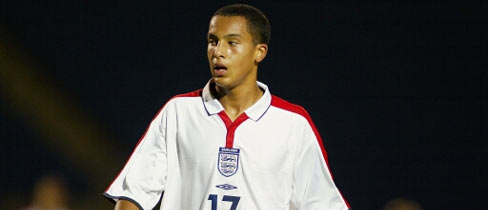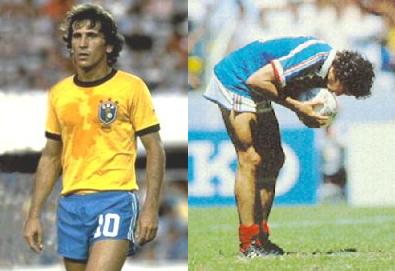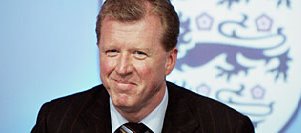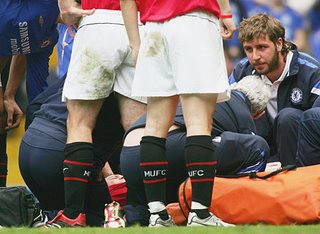
Probable Starting XI: Van der Sar, Ooijer, Mathijsen, Van Bronkhorst, Krompamp, Van Bommel, Cocu, Van der Vaart, Van Persie, Robben, Van Nistelrooy
"Big names mean nothing to me, I am only interested in good players", announces Marco Van Basten in an interview.
Himself a big name - one of the two biggest names in dutch football history, together with his mentor Johann Cruyff - Van Basten's reign as national manager of Holland has been one of refreshing change. Gone are the player-power uprisings, the in-fighting, the prima-donna displays and the racial divide that always seem to cripple the orange army at the tail end of tournaments, if they get there at all.
It is no secret that whenever Holland qualify for a major tournament, they tend to do it on the back of a nervy and dramatic run, and then perform very well at the tournament, often getting as far as the semi-finals. They were runners up at two World Cups, semi-finalists of one. They reached the semi-finals of a whopping four of the last five Euro tournaments, winning the 1988 edition here in Germany. But Holland are also notorious for failing to even get there, as they missed world cups 82, 86 and 02, so when Van Basten touted his "big names mean nothing to me" ethos, and backed it up with the best qualification record in europe, dutch fans worldwide sat up and began to take note of this intriguing run.

So professional has Van Basten been that his bright orange men have gone completely under the radar, slipping beneath a plethora of metatarsal features, goalkeeping selection conundrums and a host of other miscellaneous world cup news. But if big names aren't on his agenda, who exactly are the 23 men, or at least the ones that matter, who figure in Van Basten's coup for glory?
Holland under Van Basten play a typical 4-3-3, with a lone striker supported by two out-and-out wingers. it is a typical dutch style that is familiar throughout the Eredivisie.
In goal, business runs as usual, as Edwin Van der Sar, now a veteran from France 98, retains his position. No drama there.

In the heart of defence, we are likely to see the pairing of Joris Mathijsen and Andre Ooijer, the former a promising young centre-back and the latter, a benchwarming veteran from France 98. Between them, and Khalid Boulahrouz, the dutch centrebacks conceded only 3 goals in 12 qualifying games. Ooijer brings pace and experience to the backline while Mathijsen is recognised for his link play between defence and midfield.
The fullback positions are likely to be occupied by Barcelona's Giovanni Van Bronkhorst, and Liverpool man Jan Krompkamp. Both are adept at defending, but are notably better going forward, with pace and a good cross key qualities.

The midfield trio sees veteran Philip Cocu make a swansong as his vast experience - Cocu is a survivor from USA 94 - will be called upon in a first xi boasting many youngsters. Cocu's ability to spread play and read the game will be operated alongside Barcelona's Mark Van Bommel, the free-scoring midfielder who also adds bulk to the team. This will be needed especially as a foil for the third midfielder, possibly Rafael Van Der Vaart - the lightweight attacking midfielder who can score goals, drift to the left wing, cross and run at defenders.
Van Der Vaart plays best off the front striker, occupying the "hole" position between midfield and attack, where his pace and guile can cause defenders trouble. However, the 4-3-3 system suits him poorly, and though he has excelled as one of the midfield trio (Van Basten has spoken glowingly of his defensive contributions when played in midfield), you feel that the precocious VDV can be better employed elsewhere.

If Van Der Vaart doesn't in fact start, the benefactor might be Wesley Sneijder, who has recently impressed as a midfield general - dimunitive Sneiijder may be, yet he packs in the kind of tenacious midfield display that remind us of players like Gatusso or Davids. Added to that, Sneijder is also a free-kick specialist, a specialised role absent from any dutch team since Pierre Van Hooijdonk graced an orange top. Denny Landzaat, a midfielder with a penchant for converting penalties, is also an option for this position.

His right-sided alterego was for the largest time Feynoord's striker Dirk Kuyt - although Kuyt has recently been spoken of by Van Basten more as a deputy in the lone striker position. The task could fall to Robin Van Persie of Arsenal. Inexperienced by hugely talented, Van Persie is naturally left sided and left footed, though he has in recent friendlies begun games opposite Robben. In an recent interview, Robben expressed his interest in the floating wing system employed by Van Basten, where he and his wing partner would turn up on each others' flanks, interchanging in what must surely be reminiscent of the Total Football concept of the dutch in the 1970s.
In the target-man role, Ruud Van Nistelrooy needs little introduction - his size, strength, positional ability and finishing nuous makes him the perfect target man in a 3-man forward line. Nonetheless, his deputy, Dirk Kuyt, will be chasing him for a place, and should figure prominently, if not as a starter, then as a regular supersub.
Holland are pitted in the group of death: this means Argentina, Serbia & Montenegro and Ivory Coast. They will need to navigate the group carefully, ensuring that the draws that have crippled them are converted into those slender victories that they are currently chalking up in friendlies. Avoiding defeat against Argentina will be a major task, and that showdown should feature as the highlight of the first round.
Typically, Holland go to the world cup with a gliteratti of superstars. This time around, the only two legitimate superstars are Van Nistelrooy and Robben. 15 of their 23 man squad play in the Dutch Eredivisie, a sure sign that Marco Van Basten means what he says when he says "Big names mean nothing to me". Now, the world will wait and see if Van Basten's locally based Orenje can make a global impact.
Likely stars: Ruud Van Nistelrooy
Ruud Van Nistelrooy
His goalscoring prowess has to be at its sharpest because as the lone striker, Holland will be depending on this man to score lots of goals. Anything less than 4 goals should be a failure for the master of the six-yard box.
Arjen Robben
His form has been dulled by injury, but at his best, can terrorise fullbacks all day with his trickery and pace. Will be seen as Van Nistelrooy's main suource of attacking support.
Mark Van Bommel
The midfield general was initially ostracised by Van Basten, but brought back into the fold to great effect. Van Bommel commands the center of the the park and contributes his fair share of goals from midfield.
Trivia:
Most likely to beat up a referee: This well-tempered dutch squad leaves little room for... oh wait. Robben. First he beats the referee, then he falls down and pretends to be injured.
Most likely to miss in a penalty in a shootout: Philip Cocu - he's missed them before. oh how he's missed them before!!!
Most likely to get a bigger contract after the tournament: If Holland do well, there will be a mass exodus out of the Dutch League in July. Many, many, many big contracts, everywhere. Ironically, the biggest mover will still be Van Nistelrooy.
Most likely to retire after the tournament: Cocu and maybe Van der Sar. Time's catching up for these veterans.
Click on the links for Team Profiles of the following: Argentina, England, France, Italy.









[get this widget]
 The world cup will be won and lost by goals. But often, it is not the goals themselves that we remember, but the celebrations that follow. We see more and more elaborate and memorable goal celebrations in league football, but at the highest level, it is still by and large a rarity. Nonetheless, there are enough good ones for us to compile a favourites. Some are are dramatic, some are cheeky and others are just outright goofy (though perhaps not as goofy as Christophe Dugarry's goal celebration against South Africa in France 98, where he stuck his tongue out, opened his eyes wide and jumped around like a clown!). Here, in no particular order, are five of the most memorable world cup goal celebrations.
The world cup will be won and lost by goals. But often, it is not the goals themselves that we remember, but the celebrations that follow. We see more and more elaborate and memorable goal celebrations in league football, but at the highest level, it is still by and large a rarity. Nonetheless, there are enough good ones for us to compile a favourites. Some are are dramatic, some are cheeky and others are just outright goofy (though perhaps not as goofy as Christophe Dugarry's goal celebration against South Africa in France 98, where he stuck his tongue out, opened his eyes wide and jumped around like a clown!). Here, in no particular order, are five of the most memorable world cup goal celebrations.



















